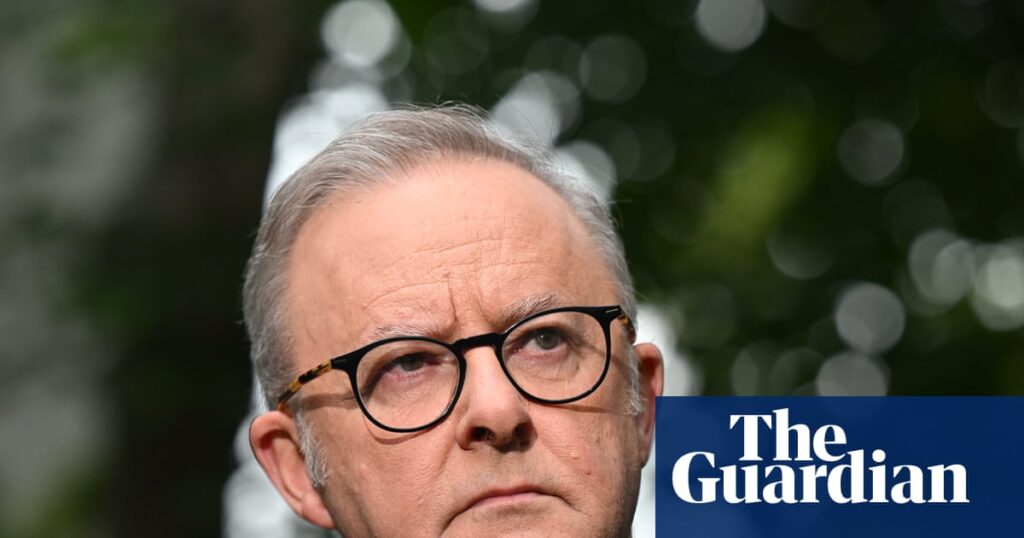Australia could split hosting rights for the Cop31 climate summit under a potential compromise being considered with Turkey, as Anthony Albanese concedes Ankara is determined to stay in the race, even risking both countries’ claims on the 2026 event.
Returning home from the UN general assembly and visits to the UK and the Middle East on Wednesday, Albanese told Guardian Australia he wished host countries were not decided using consensus rules, but pledged to continue diplomatic talks with the government of Recep Tayyip Erdoğan.
Only one country can hold the Cop presidency, but a range of set-piece meetings take place before and after the leaders’ summit.
Government sources said there was precedent for previous climate summits to be co-hosted or organised across different locations.
Albanese would not be drawn on any possible solution in an interview, but left open the option of supporting Turkey in future international negotiations.
“We’re just engaging through,” Albanese said. “A clear majority of nations want Australia’s bid, but it’s clear also that this is a complex situation and we’ve got to try and resolve it.”
Sign up: AU Breaking News email
Turkey’s climate minister, Murat Kurum, this week floated the possibility of “innovative solutions” in which both countries could win. After meeting the climate change and energy minister, Chris Bowen, in New York, he said Australia and Turkey were examining options with the support of the UN climate secretariat.
Australia wants to host the summit in Adelaide, in a joint proposal with Pacific nations. Pacific Island climate ministers will hold talks in Sydney on Thursday and Friday.
“We’ll continue to engage constructively with our Turkish counterparts,” Albanese said. “It’s not just our bid, it is us and the Pacific as well.”
Asked if he was optimistic or uncertain about resolving the impasse, Albanese said he remained unsure, because of the complex rules.
Australia has at least 23 votes among the critical 28-country Western European and Others group, whose turn it is to host the summit. But if consensus cannot be reached, UN rules would send the conference to the German city of Bonn.
“I am certain of Australia’s support but if there’s two countries there, it reverts to Bonn,” Albanese said.
The trip – including an address to the general assembly in New York and his first in-person interaction with the US president, Donald Trump – coincided with major developments in international affairs.
The Pentagon signalled the $368bn Aukus nuclear submarine deal was safe, despite a lengthy review, and Trump unveiled a peace plan for Gaza, with the backing of Israel’s prime minister, Benjamin Netanyahu, and a growing list of partners.
Albanese will meet Trump at the White House on 20 October. The visit will be more than just a stand-alone meeting, and with three nights planned in Washington DC.
Albanese said Australia, the UK and Canada, as Five Eyes intelligence countries, had contributed vital momentum towards the Trump plan, with coordinated recognition of Palestinian statehood helping firm US resolve. Albanese praised the efforts of the French president, Emmanuel Macron, as vital, including through convening a special conference with Saudi Arabia last week.
“Recognition wasn’t in isolation from the decision of the Arab League to issue a powerful statement in June, which not only called for a ceasefire and advancement of two states, but also the isolation of Hamas and the recognition, clearly and unequivocally, of 7 October as a terrorist act.
“There’s been proposals in writing, with this plan being discussed between leaders. Australia has been part of that.
after newsletter promotion
“Recognition by three of the Five Eyes was significant.”
Albanese said Israel’s prime minister, Benjamin Netanyahu, had a critical role to play, including in maintaining peace if the deal holds. Far-right political allies of Netanyahu have already criticised the plan, while Hamas has a few days to sign on to US demands.
Albanese said he was hopeful “that after a very dark period, there’s a crack of light”.
“It is not a zero-sum game. Security and peace for Israelis and Palestinians is tied together. You can’t have one without the other.”
The opposition leader, Sussan Ley, has accused Albanese of enduring a month of foreign policy failures, starting with planned security agreements with Vanuatu and Papua New Guinea, neither of which were signed. She dismissed Albanese’s statement to the UN on Palestine and criticised his decision to speak at the UK Labour party’s annual conference in Liverpool as partisan.
The Greens and some environmental activists have criticised Labor for the government’s 2035 emissions reduction target of 62% to 70%.
Albanese said he had always been confident about the future of the Aukus agreement, because the plan was in the interest of all three countries. It looks set to survive the review by the US under secretary of defence for policy, Elbridge Colby, a known sceptic.
Buoyed by the success of his 11-day overseas trip, Albanese pledged to bring an Australian approach to his relationship with Trump.
“I just deal with international leaders honestly. Normally, I start off with people at 100% and I think the Australian way is to engage in a straightforward, polite, friendly way.
“I’ve built good relations with leaders all over the world, across the political spectrum. This trip has been an example of that, with the number of bilaterals, with engagement with Pacific leaders, Asean leaders, European leaders, North American as well,” he said.
“We’ve worked hard, but it has been very productive.”

